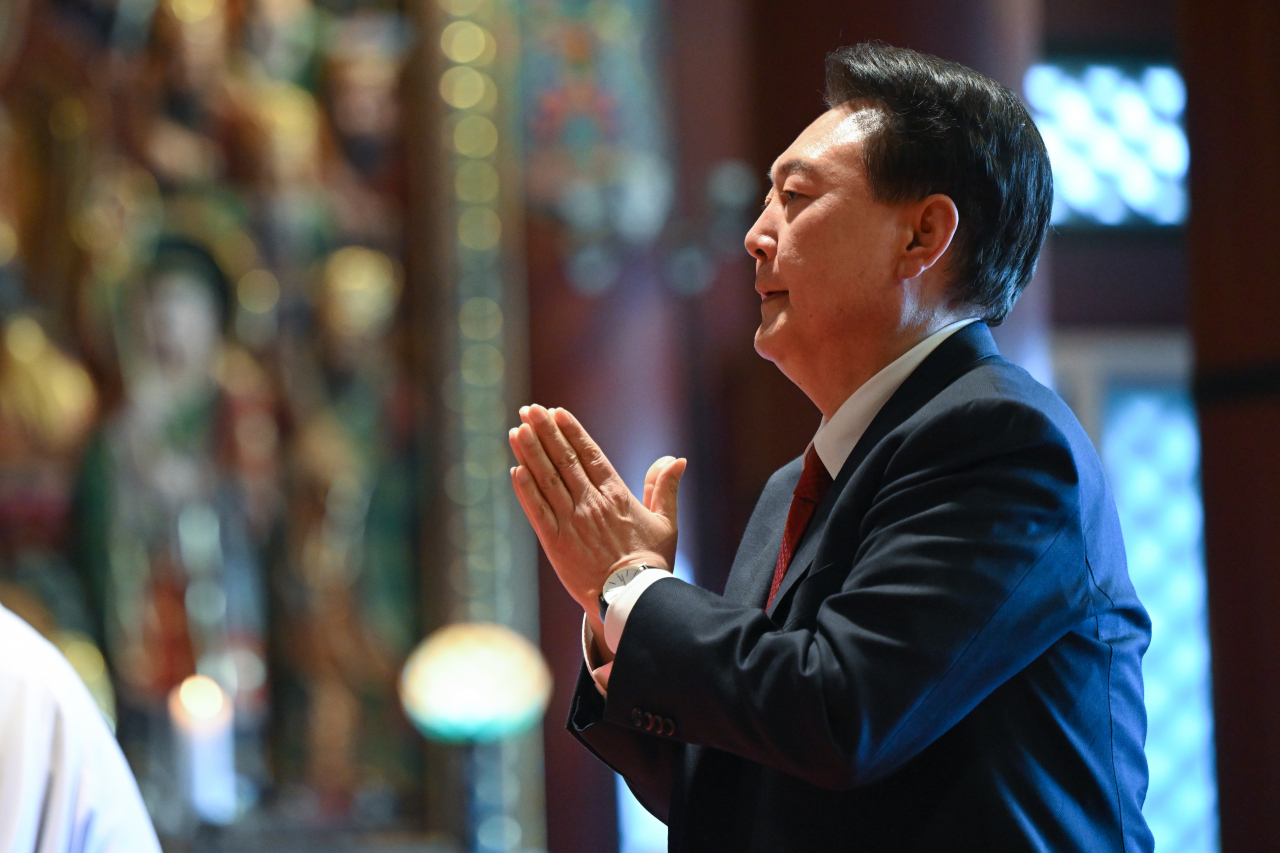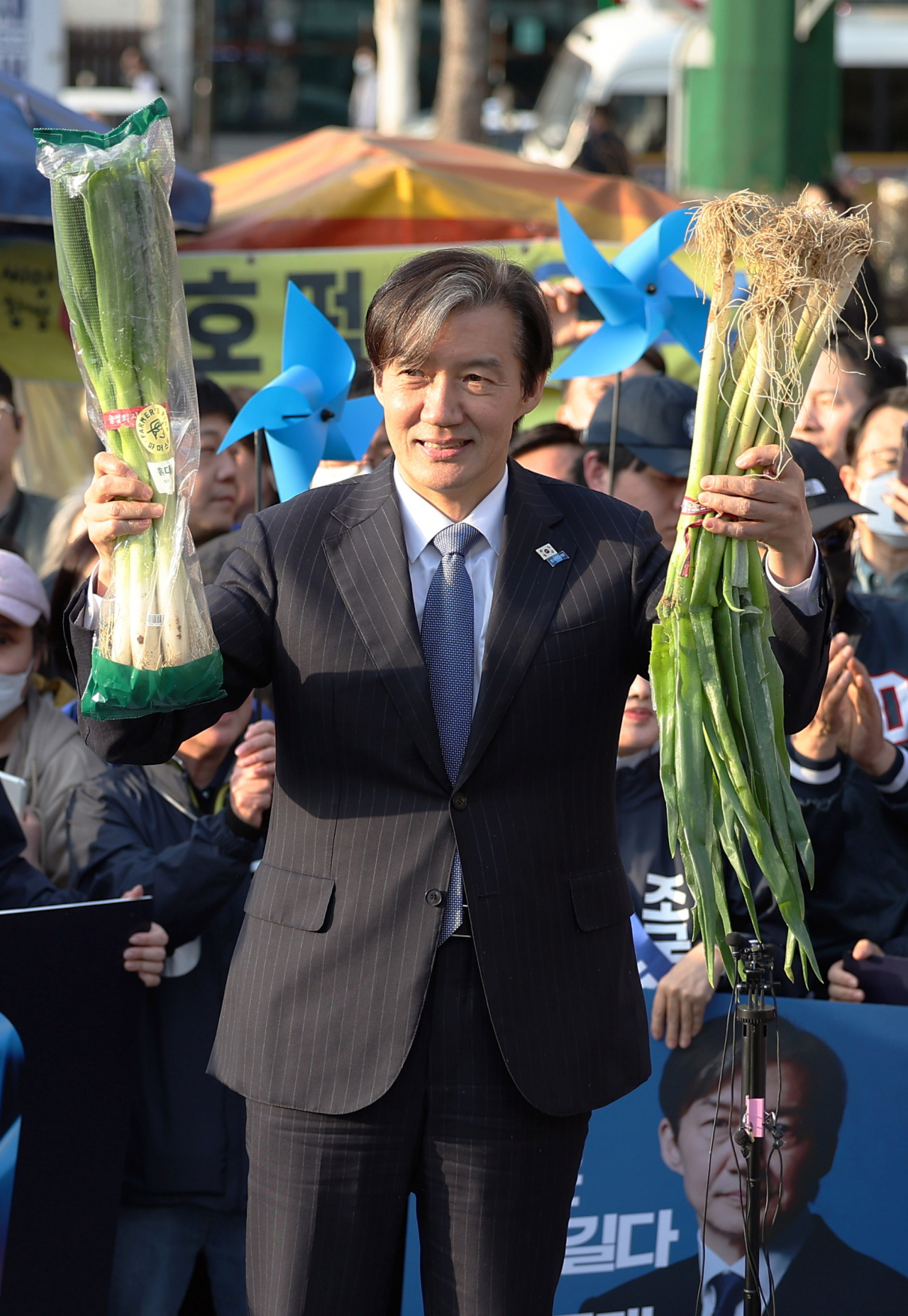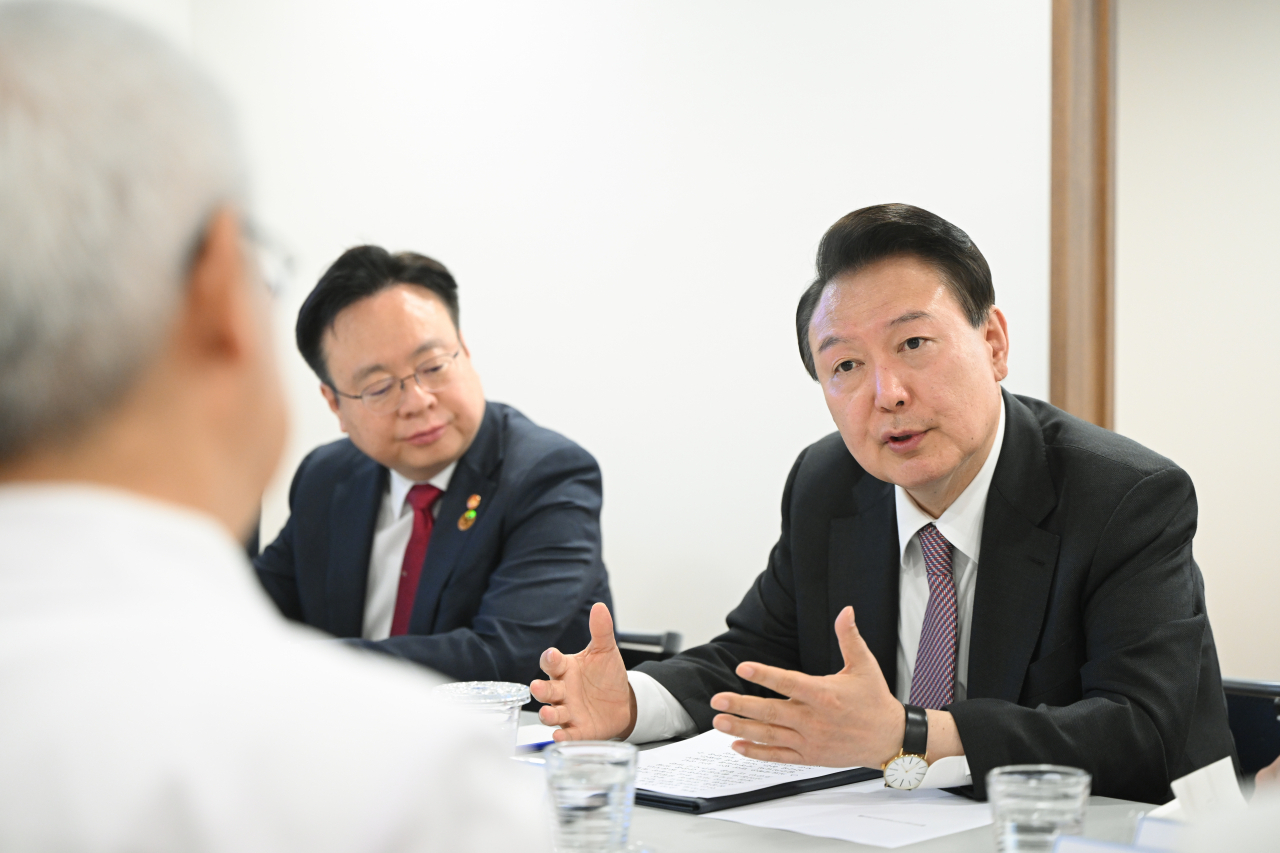 |
President Yoon Suk Yeol visits Samgwangsa, a Buddhist temple in Busan, April 5. (Presidential office) |
President Yoon Suk Yeol's fate was hanging in the balance as Koreans went to the polls Wednesday,
The exit poll and the early ballot counting of the legislative general election suggested a gloomy outlook for the ruling bloc, which could send the conservative president into an early lame-duck phase, with three years remaining in his term.
The exit poll suggested that opposition parties could secure two-thirds or more of the seats in the 300-member National Assembly, which would grant them enough legislative power to override a presidential veto and even impeach the president. Early ballot counting as of press time on Wednesday showed that scenario was unlikely, if not impossible.
The percentage of nationwide ballot counting for constituency seats was reported at 55 percent as of 11 p.m. with the Democratic Party of Korea winning 154 seats and the People Power Party 96 seats, according to the National Election Commission. There are 254 constituency seats in total, with 46 more allocated by proportional representation.
In the previous 2020 election, the main opposition Democratic Party won 180 seats, enough to fast-track bills to the plenary session of the National Assembly and unilaterally pass the bills there.
The predicted election loss for the ruling party on Wednesday would further weaken Yoon's policy drive, as well as his hard-line stance toward North Korea, which he has pursued through closer alignment with the United States and Japan.
Political heavyweights from the opposition bloc painted a darker picture concerning Yoon's future if the ruling party suffered a significant defeat, as his five-year term, which started in May 2022, is not even halfway through.
Lee Nak-yon, the former prime minister who founded the minor opposition New Future Party in February, said in a radio interview Tuesday that Yoon “will likely be forced to drop out of his conservative party,” adding that South Korea will be “mired in a more severe crisis.”
“If the ruling party sees a bad result, calls on (Yoon) to quit the party will erupt immediately as newly-elected lawmakers tend to be aggressive in the first year of their term,” Lee said, who has served five terms as a lawmaker. “Yoon will then quit the party and face the opposition bloc's proposal to impeach himself.”
Lee also pointed out in his interview that Yoon's family -- his wife Kim Keon Hee and his mother-in-law -- and his opposition heavyweights -- Democratic Party of Korea Chair Rep. Lee Jae-myung and Rebuilding Korea Party founder Cho Kuk -- are either facing criminal allegations or have already been convicted of crimes.
 |
Cho Kuk, leader of the Rebuilding Korea Party, holds bundles of scallions during his visit to Seongnam, Gyeonggi Province, April 1. (Yonhap) |
Meanwhile, before the election, Yoon‘s political opponents urged voters during their election campaigns to terminate the current administration before the president’s term ends.
Both leaders of the opposition parties were seeking revenge as they believed their court trials and even convictions were the result of political persecutions led by a politically motivated prosecution. Yoon was formerly a prosecutor-general before he was elected the nation‘s top leader in 2022, only a few months after he made his political debut.
The Democratic Party's Lee Jae-myung, who faces multiple charges regarding a high-profile land corruption scandal, said during his campaign efforts on March 21 that Yoon and his administration “should be dismissed” and “do not deserve to represent their people.”
Cho of the Rebuilding Korea Party, formerly a justice minister who established his party in March to seek a seat through proportional representation, said he would fight with the Yoon administration “to make (Yoon) a lame-duck president, and further a dead-duck president,” during a press conference at the Seoul Foreign Correspondents‘ Club in late March.
Cho, who appealed a high court verdict that sentenced him to two years in prison for a university admissions scandal involving his children, also said that his goal was to “neutralize (Yoon's) political power,” adding he was “not sure whether Yoon could stay in power during the remaining three years of his term.”
Other liberal political figures have also upped the ante on Yoon, saying the time was drawing near for the president‘s power to be undermined.
Park Jie-won, former head of the National Intelligence Agency who looked certain to secure a safe parliamentary seat in a constituency in South Jeolla Province, a liberal stronghold, said in a televised interview with JTBC on April 1 that Yoon‘s “lame-duck period has already begun.” Park was seeking a fifth term as a lawmaker, representing the Democratic Party.
Former Unification Minister and four-term lawmaker Chung Dong-young, who pursued election in the Jeonju-C constituency of North Jeolla Province in Wednesday‘s election, also said in a radio interview with YTN in January that a landslide victory for the main opposition “will herald a chance to legitimately put an end to the Yoon administration.”
Calls for Yoon's early departure from the party have also come from within the ruling party.
Ham Un-gyeong, a People Power Party candidate for the general election in a constituency of Mapo-gu in Seoul, demanded on April 1 that Yoon “no longer intervene in politics,” and asked Yoon to leave the party, amid a prolonged standoff between the government and the medical community over a proposed increase in the annual medical school enrollment quota.
A day later, Ham said he retracted his statement.
Having an unpopular president representing the conservative bloc is also a risk to the ruling party, as it could tarnish its chance of securing another presidential victory in 2027.
In the short democratic history of South Korea, it has not been unusual for presidents to quit their party. From the late 1980s through 2022, before Yoon came to power, five out of six democratically elected presidents left the party with which they were affiliated during their presidential terms. Yoon‘s liberal predecessor Moon Jae-in was the only exception.
Observers view that the Yoon administration has long been plagued by poor communication with the public, as seen in recent incidents where protesters -- affiliated with minor progressive parties -- had their mouths covered while being dragged out of events that Yoon was attending.
A Yoon aide‘s recent controversial remarks about press freedom and the Gwangju Democratic Uprising also sparked public fury, as did Yoon’s decision to name a scandal-ridden former defense minister as the new ambassador to Australia. The administration insisted on its decision despite controversies about the former minister's overseas travel ban, and accepted his resignation more than three weeks after the nomination.
 |
President Yoon Suk Yeol (right) visits a hospital in Bucheon, Gyeonggi Province, Tuesday. (Presidential office) |
This prompted a fall in the president‘s popularity, overshadowing an increase in February partly thanks to Yoon’s hardline stance against doctors protesting the medical school expansion plan, in a country suffering from doctor shortages in essential sectors.
According to a poll by Realmeter on Monday, Yoon‘s approval rating in the first week of April came to 37.3 percent, closing a six-week losing streak after reaching a peak at 41.9 percent in the fourth week of February.
Critics also pointed to Yoon's failure to maintain his administration’s core values, namely justice and common sense, as his family has been embroiled in multiple scandals. These include the high-profile “Dior bag scandal” involving first lady Kim Keon Hee, who has kept out of the public eye for four months, having last been seen after returning to Korea from Yoon’s trip to the Netherlands in mid-December.
Choi Jin, a political commentator who heads the Seoul-based Institute of Presidential Leadership, said the opposition parties are capitalizing on the current situation by raising public ire.
“Yoon‘s unilateral leadership has opened the way for public criticism, so the opposition parties are strategically instigating people's anger,” Choi said, adding, “Their strategies would have backfired otherwise.”
Choi added that Yoon becoming a lame duck would “paralyze the administrative system and disrupt people‘s livelihoods,” as Yoon’s power plays will no longer work.







